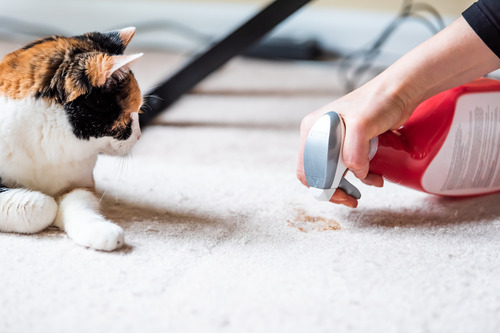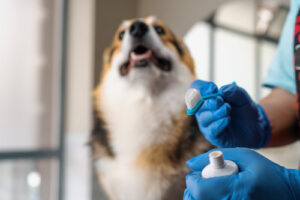You walk into the room and find a mess on the floor—your cat has vomited again. Is it just another hairball, or could something more serious be going on? Many cat owners face this question at some point, and it’s not always easy to tell when to wait it out or when to pick up the phone. While an isolated incident might not mean trouble, recurring or severe vomiting often points to an underlying issue. In this blog, we’ll explore the common causes of cat vomiting, what signs you shouldn’t ignore, and how to know when it’s time to call Sunset Animal Hospital in Houston for help.
What Causes Cat Vomiting?
Vomiting in cats happens for many reasons. It can be a one-time event or part of a chronic condition. Identifying the potential cause can help determine whether it’s something simple or more complex.
Hairballs and Grooming Habits
Many cats vomit due to hairballs, especially long-haired breeds or those who groom frequently. As cats lick their fur, they swallow loose hairs, which can form clumps in the stomach. These hairballs are often vomited up, and while this is relatively normal, frequent occurrences may need attention.
Dietary Indiscretion or Food Sensitivities
A sudden change in diet, eating too quickly, or consuming something outside their normal food (like houseplants or human food) can irritate a cat’s stomach. Cats with food allergies or intolerances may also vomit after meals.
Gastrointestinal Issues
Conditions like gastritis, inflammatory bowel disease, or intestinal parasites can lead to chronic vomiting. In these cases, cats may vomit regularly and show other signs like diarrhea, weight loss, or lethargy.
Toxins and Foreign Bodies
Cats are naturally curious, and ingesting toxic plants, medications, or non-food items can trigger vomiting. If your cat may have eaten something they shouldn’t have, a call to your vet is warranted immediately.
Underlying Medical Conditions
Kidney disease, liver disease, hyperthyroidism, and diabetes can all cause vomiting in cats. These conditions often present with additional symptoms, but vomiting may be one of the earliest signs.
Occasional vs. Frequent Cat Vomiting: What’s Normal?
A single episode of vomiting, especially if your cat is acting normally otherwise, may not be cause for alarm. However, repeated vomiting—or vomiting paired with other symptoms—can point to a more serious concern.
When a One-Time Incident Might Be Benign
If your cat vomits once, continues eating, and remains playful and energetic, it may not require immediate veterinary care. Keep an eye out for any changes in appetite, behavior, or litter box habits over the next 24–48 hours.
When Vomiting Becomes Concerning
Repeated vomiting within a short period, vomiting more than once a week, or throwing up along with diarrhea, lethargy, or refusal to eat should prompt a call to your vet. Vomiting with blood, bile, or foam also requires immediate attention.
What to Watch for Beyond Vomiting
Vomiting is a symptom, not a diagnosis. Paying attention to other signs can help determine whether your cat’s condition is urgent.
- Changes in Appetite and Thirst: Loss of appetite, increased thirst, or refusal to eat for more than 24 hours can indicate that your cat’s body is under stress or dealing with a larger issue.
- Lethargy and Hiding Behavior: Cats often hide when they feel unwell. If your cat is vomiting and also unusually quiet, withdrawn, or hiding more than usual, this behavior may signal pain or illness.
- Weight Loss and Coat Changes: Unexplained weight loss or a dull, greasy, or unkempt coat can be signs of an underlying health problem. These changes often go hand-in-hand with chronic vomiting.
Should You Wait or Call the Vet?
Sometimes it’s difficult to decide whether to wait and monitor your cat or make the call right away. Here’s a breakdown of what’s typically safe to observe at home and what’s not.
Situations Where You Can Monitor at Home
- A single instance of vomiting with no other symptoms
- Your cat is otherwise active, eating, and behaving normally
- Vomit appears to be a hairball and this happens infrequently
If you choose to monitor at home, remove food for a few hours and offer water in small amounts. Reintroduce food slowly, starting with a bland diet if your vet recommends one. If vomiting continues, call your vet.
When to Call Sunset Animal Hospital
Call our team at (713) 526-5881 if:
- Your cat vomits multiple times in a day
- Vomiting lasts more than 24 hours
- There’s blood, foam, or yellow bile in the vomit
- Your cat also has diarrhea or refuses to eat
- You suspect your cat ingested something toxic
- Vomiting is recurring weekly or becoming more frequent over time
What Your Vet Will Want to Know
If you do bring your cat to Sunset Animal Hospital for vomiting, a detailed history can help guide the diagnostic process. Be prepared to answer questions like:
- When did the vomiting start?
- How often is it happening?
- What does the vomit look like (color, consistency, contents)?
- Has your cat had any changes in diet, environment, or behavior?
- Are there other symptoms like diarrhea, weight loss, or lethargy?
Your vet may recommend bloodwork, X-rays, or an abdominal ultrasound depending on your cat’s symptoms and medical history.
What Not to Do if Your Cat is Vomiting
While it’s tempting to try home remedies or over-the-counter treatments, avoid giving your cat any medications without veterinary guidance. Human medications—even those considered mild—can be dangerous or even fatal for cats. Additionally, do not withhold water for long periods, as dehydration can worsen your cat’s condition. Instead, provide access to clean water while monitoring your cat’s intake.
How Cat Vomiting Affects Long-Term Health
Chronic vomiting, even if it’s mild or sporadic, can take a toll on your cat’s health. Repeated episodes may lead to dehydration, nutrient deficiencies, and weight loss.
Dehydration Risks
Each vomiting episode results in fluid loss. Over time, even mild dehydration can affect organ function and energy levels, especially in older cats or those with pre-existing conditions.
Nutritional Deficiencies and Weight Loss
Cats who vomit regularly may not absorb enough nutrients, even if they’re eating well. This can lead to weakness, dull coats, and decreased immunity.
Stress and Behavioral Changes
Ongoing discomfort or illness can cause stress, irritability, or withdrawal. These behavioral changes often go unnoticed at first but can escalate over time if the underlying cause of vomiting isn’t treated.
Taking Action Helps Your Cat Feel Better Sooner
When your cat is vomiting, staying alert to the frequency, appearance, and associated symptoms is key. Even if vomiting seems minor, it’s often a sign that something in your cat’s body isn’t working as it should. If you’re unsure, it’s always better to err on the side of caution. The experienced team at Sunset Animal Hospital is happy to help. Our knowledgeable veterinary team in Houston can evaluate your cat’s condition and recommend the next steps to support their health. If your cat is vomiting, call us at (713) 526-5881 or book an appointment online today.





